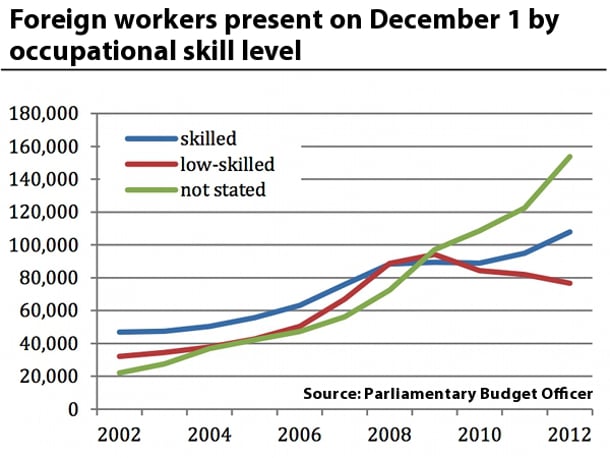
Canada's budget watchdog says there isn't enough information about temporary foreign workers, noting the dearth of data makes it difficult to assess the impact these workers have on the economy.
Jean-Denis Fréchette's comments echoed concerns raised by Opposition critic Jinny Sims in a Tyee report on temporary foreign workers hired at Facebook.
Yesterday, Fréchette released a report showing the number of temporary foreign workers in Canada jumped by more than 200,000 in a decade -- rising from 101,098 to 338,221 between 2002 and 2012.
However, Fréchette noted that the government did not list the skills of nearly half -- about 154,000 -- of those foreign workers in Canada in 2012. As a result, he could not determine what job positions they held, the report said. Without that information, Fréchette said he can't fully assess the impact foreign workers have on the economy.
"We don't have that kind of information -- what kind of occupations they are even," he said in a phone interview. "In principle, foreign workers coming on a temporary basis is not something that's always bad, for some areas and positions when you have a clear lack of domestic workers."
On Wednesday, The Tyee reported that the federal government approved a request by Facebook to bring 93 temporary foreign software engineers to its Vancouver offices, which have since closed.
During an interview concerning the Facebook hirings, Sims also noted the dearth of information.
"The government can't make informed decisions because they don't even have the sectoral data about what the needs are in the labour market," the New Democrat MP said in a phone interview from Ottawa. "We need that data so we can make informed decisions."
Despite the increase, the total number of foreign workers in 2012 made up just 1.8 per cent of the country's workforce, Fréchette said, leading him to question the notion that non-Canadian employees necessarily take away jobs from residents.
In his report, Fréchette found that, after the 2008 recession, the makeup of foreign workers shifted from mainly low-skilled to skilled positions.
However, his main concern was the lack of data about the skill set of many foreign workers.
Two streams of workers
Fréchette's report noted that one reason for the lack of statistics about the skill levels of nearly half of foreign workers is because they can come through two different streams -- the Temporary Foreign Worker Program, and the separate International Mobility Program, which allows employers to hire or bring in foreign workers without the need of a Labour Market Impact Assessment. The assessments are the government's measure of whether hiring a foreign worker would have a negative, neutral or positive impact on the local labour force.
In 2012, the government did not require assessments from 68 per cent of foreign workers, the report said.
Fréchette described his office's report as a "high-level overview" of how important temporary foreign workers are to the Canadian economy.
The Migrant Workers Alliance for Change, the country's largest coalition of migrant worker rights groups, said it supported Fréchette's conclusions.

"A lot of people have taken on this clarion call that migrant workers are somehow taking away Canadian jobs, based on incorrect data," said spokesman Syed Hussan in a phone interview from Toronto. "The Parliamentary Budget Officer is saying clearly there is no data, and in any case the numbers are too small to say that. Yes it tripled, but we're talking about such a small percentage of the total workforce... they're not stealing jobs.
"We need to refocus on what's important. This is a good time to take a breath of fresh air: the big problem is the lack of labour rights and protection [for migrant workers]."
Hussan wants to see more data collected on foreign workers, including what they're contributing to the economy, what taxes they pay and what services they access.
Hussan said there is a "huge lack of data in Canada generally on immigration" and "lack of any holistic labour data on migrant workers."
Asked if he had any recommendations for collecting more data on migrant workers, Fréchette laughed.
"The Parliamentary Budget Officer never makes any recommendations," he said. "We just provide information, facts and figures."
He added that since his report on the same topic last year, the federal government announced increased funding for Statistics Canada to look at temporary foreign workers. ![]()
Read more: Politics, Labour + Industry














Tyee Commenting Guidelines
Comments that violate guidelines risk being deleted, and violations may result in a temporary or permanent user ban. Maintain the spirit of good conversation to stay in the discussion.
*Please note The Tyee is not a forum for spreading misinformation about COVID-19, denying its existence or minimizing its risk to public health.
Do:
Do not: